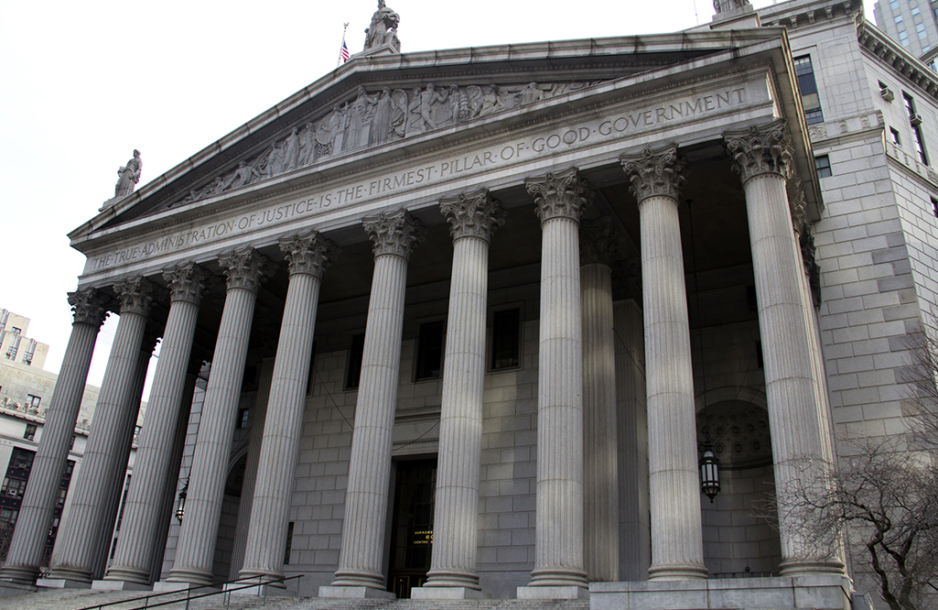News & Media
Media Coverage
SLS News & Announcements

Stanford Law School Professor Daniel Ho Elected to the American Academy of Arts and Sciences
The American Academy of Arts and Sciences (AAAS) announced on April 24, 2024, that Stanford Law School’s Daniel Ho was elected to the Academy. Founded in 1780 “to help a young nation face its challenges through shared purpose, knowledge, and ideas,” the AAAS is “both an honorary society that recognizes…
Read MoreContacts

Need photos, videos, podcasts or research articles?
Send an email to communications@law.stanford.edu

For institutional matters
Please contact communications@law.stanford.edu
Legal Aggregate

Having three oral arguments before the United States Supreme Court in the same term is an accomplishment that only a…
Learn more
Stanford Law School (SLS) recently launched a first-of-its-kind center focused on establishing the policies, laws, and global practices that will…
Learn more
(Originally published by Public Policy Institute of California on March 25, 2024) Does the public sector need the private sector’s help…
Learn more
Video Center
Stanford Lawyer Magazine
Social Media
Learn about the California Racial Justice Act of 2020 in a new blog post by the Stanford Center for Racial Justice.
Read more: https://stanford.io/49P4H6I
Zeid Ra'ad Al Hussein, head of the International Peace Institute and former UN High Commissioner for Human Rights, will visit SLS for several events and to accept the Ralston Prize in International Law. https://stanford.io/3JAwXzb
Jennifer Chacón (BA ’94), the Bruce Tyson Mitchell Professor of Law at Stanford Law School, wrote a book (with Susan Bibler Coutin, and Stephen Lee) titled, Legal Phantoms: Executive Action and the Haunting Failures of Immigration Law (Stanford University Press), which examines questions of ...national identity and immigration.
This book interviews would-be applicants of the deferred action program (DAPA) for parents of citizens and lawful permanent residents that President Obama attempted but ultimately fell short of implementing, along with immigration rights advocates and government officials. These interviews illustrate how such failed immigration reform programs affect individuals, families, communities, and the country. This is a story of resiliency and how individuals have forged onward despite a difficult and uncertain legal landscape.
https://stanford.io/44gaHEz
“Our hope is to work closely with Senegalese civil society groups to analyze systemic challenges to democracy there and to propose avenues for reform,” said SLS Professor and the Executive Director of the Rule of Impact Lab, Amrit Singh, in a profile by The Stanford Daily.
On March 24,... Bassirou Diomaye Faye, a Senegalese politician and opposition leader, won the election for the presidency, marking him as the youngest president in Senegalese history. Prior to his election, Stanford Law School's Rule of Impact Lab fought for the free election by filing a lawsuit in January against the internet shutdowns of summer 2023.
https://stanford.io/3W6t8tb
The first #earthday🌎 on April 22, 1970 rallied an estimated 20 million demonstrators and crystallized the environmental movement. Preparations were lead by SLS alum Denis Hayes, '69 JD'85, who has been honored many times as a hero of environmental activism.
This spring, the Stanford Criminal Justice Center and the Institute of Criminal Law and Criminal Justice at the University of Gottingen are partnering on a seminar titled "Police and Prisons: German and American Approaches to Reform and Abolition (2030)" for Stanford Law School students ...and Gottingen students.
The seminar examines the legal systems in the U.S. and Germany and utilizes a comparative study of debates over criminal justice reform in the two systems. Currently, six Stanford Law School students (pictured below) are taking the seminar under the instruction of SLS's Debbie Mukamal, David Sklansky, and Robert Weisberg along with six Gottingen students via Zoom. The joint class facilitates an invaluable opportunity for students interested in criminal justice reform at both universities to collaborate and learn from one another.
Last weekend was the inaugural “Order on the Court” basketball game, where sixteen of SLS’s fiercest students took on Berkeley Law’s squad under the fearless leadership of Coaches David Engstrom and Jeffrey Fisher. This was the start of a great tradition to foster community across the Bay ...as well as supporting Public Interest students, including 3L bar grants and student-run pro bono initiatives at both schools.
Last weekend was the inaugural “Order on the Court” basketball game, where sixteen of SLS’s fiercest students took on Berkeley Law’s squad under the fearless leadership of Coaches David Engstrom and Jeffrey Fisher. This was the start of a great tradition to foster community across the Bay ...as well as supporting Public Interest students, including 3L bar grants and student-run pro bono initiatives at both schools.
Read more about the inaugural game: https://stanford.io/3w9MClX
Professor Easha Anand, co-director of the Stanford Law School Supreme Court Litigation Clinic, along with Gareth Fowler, JD ’24, joined Professors Pam Karlan and Richard Thompson Ford during a live taping of the Stanford Legal podcast as they discuss three cases that Anand argued before the Court... this term, the people behind the case titles, and what it takes to represent them at the highest court in the land. Click the link in bio to listen 🎧
Congratulations to SLS student, Sara Bobok, JD '26, on receiving the Paul & Daisy Soros Fellowship. The award provides generous funding for immigrants and children of immigrants pursuing graduate degrees.
Read more: https://stanford.io/3UmKjFq
In a new online feature, Stanford Lawyer Magazine looks at an alternative spring break that gives participating SLS students a week of pro bono experience in a city plagued by foreclosures. https://stanford.io/3xFHzKv
Startup Law: Sustainability, conceived and co-taught by lecturers Molly Melius, JD ’10, and Sam McClure, JD ’17, takes a win-win-win approach to teaching SLS students about what it means to be a lawyer for a sustainability-focused startup.
Read more: https://stanford.io/3W6lfnH




